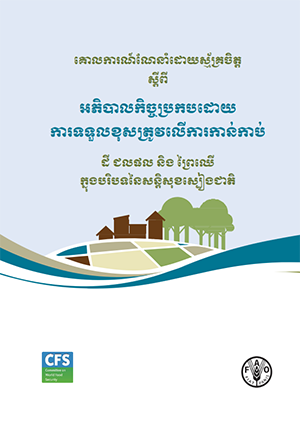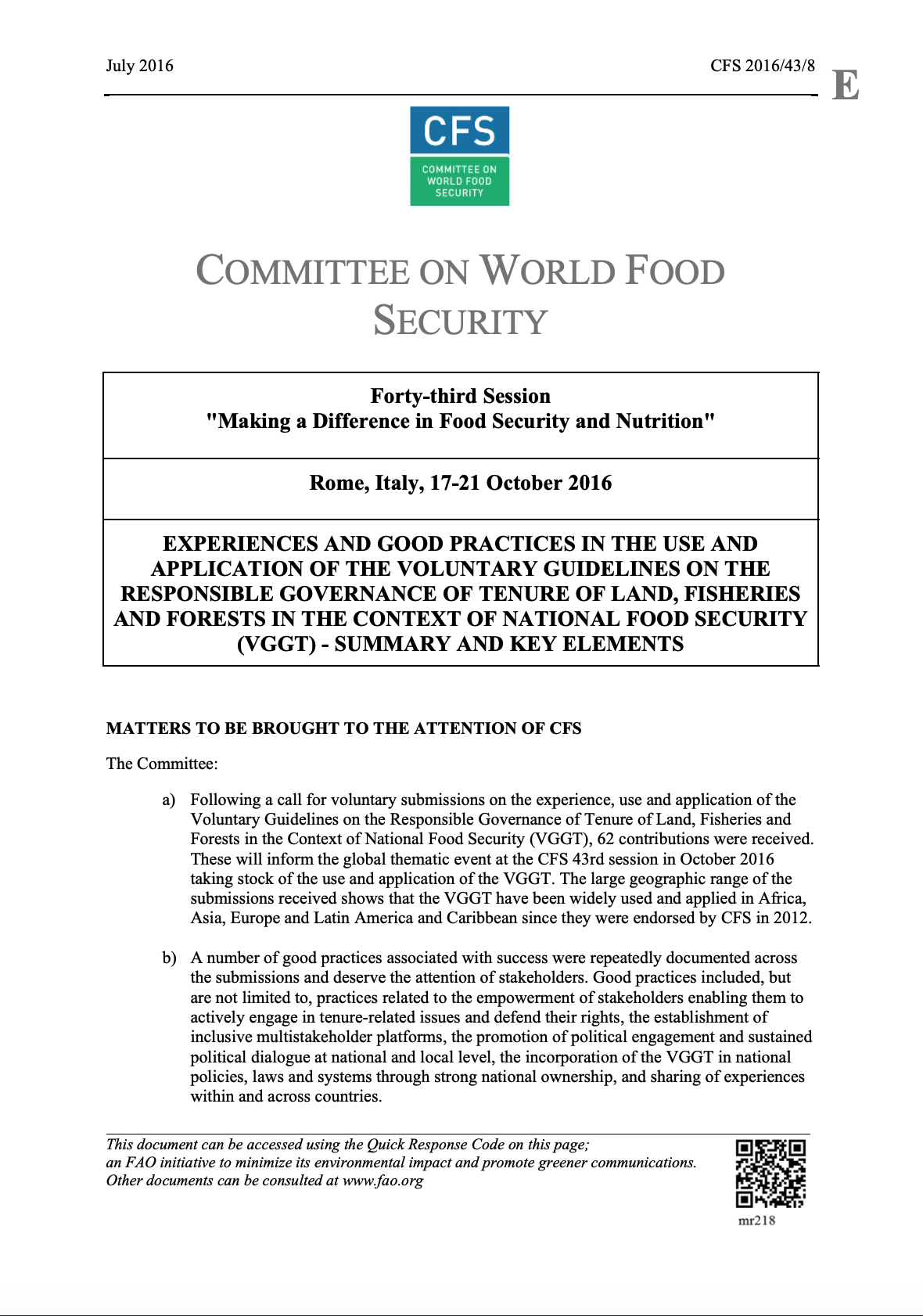The Committee on World Food Security (CFS) was set up in 1974 as an intergovernmental body to serve as a forum for review and follow up of food security policies. In 2009 the Committee went through a reform process to ensure that the voices of other stakeholders were heard in the global debate on food security and nutrition. The vision of the reformed CFS is to be the most inclusive international and intergovernmental platform for all stakeholders to work together in a coordinated way to ensure food security and nutrition for all. CFS was reformed to address short term crises but also long term structural issues. The Committee reports annually to Economic and Social Council of the United Nations (ECOSOC).
Who is part of CFS?
CFS is made up of Members, Participants and Observers. The membership of the Committee is open to all Member States of The Food and Agricultural Organization (FAO), The International Fund for Agricultural Development (IFAD) or The World Food Programme (WFP) and non-Member States of FAO that are Member States of the United Nations. Member States are encouraged to participate in CFS sessions at the highest level possible. Participants can be from representatives of UN agencies and bodies, civil society and non-governmental organizations and their networks, international agricultural research systems, international and regional financial institutions and representatives of private sector associations and private philanthropic foundations. CFS may invite other interested organizations relevant to its work to observe entire sessions or specific agenda items.
The High Level Panel of Experts on Food Security and Nutrition (HLPE) was created in October 2009 as an essential part of the CFS reform to provide independent, scientific knowledge-based analysis and advice. HLPE reports are requested by CFS and their findings and recommendations serve as a basis for CFS policy discussions.
Resources
Displaying 1 - 5 of 9በፈቃደኝነት ላይ የተመሠረቱ በአገር አቀፍ የምግብ ዋስትና ማእቀፍ ውስጥ የመሬት፣ የአሳ እና የደን ሀብት ይዞታ መብት በኃላፊነት ማስተዳደርን የተመለከቱ መመሪያዎች
የነዚህ የበጎ ፈቃድ መመሪያዎች አላማ የመሬት፣ የአሳ እንዲሁም የደን ይዞታ አስተዳደርን ለማሻሻል ምሪት መስጠት ብሎም እንደማጣቀሻ ማገልገል ሲሆን ይህም ለሁሉም ሰው የምግብ ዋስትናን ማረጋገጥ የተሰኘው መርሆን መሠረት ያደረገ እና የሰው ልጆችን በቂ ምግብ የማግኘት መብት በአገር አቀፍ የምግብ ዋስትና ማዕቀፍ ውስጥ በዘላቂነት እውን እንዲሆን ድጋፍ መስጠት ነው። የነዚህ መመሪያዎች አላማ ረሃብን እና ድህነትን ለማጥፋት ለሚደረገው አለም አቀፍ እና አገር አቀፍ ርብርብ አስተዋጽዖ ማድረግ ሲሆን ይኸውም ቀጣይነት ያለው የመሬት ልማት ለዕድገት መሠረታዊ ጉዳይ ነው የተሰኘውን መርሆ በማንገብ ፍትሃዊ የመሬት፣ የአሳ እና የደን ሀብት ክፍፍል እንዲሁም ዋስትና ያለው የይዞታ መብት እንዲኖር ማስተዋወቅን ይጨምራል። ድህነትን እና ረሃብን ማጥፋት እንዲሁም ቀጣይነት ያለው የተፈጠሮ ሀብት አጠቃቀምን ማስፈን በዋናነት የማህበረሰቡን እና ሌሎች የሚመለከታቸው አካላትን መሬት፣ የአሳ እና የደን ሀብቶች ማግኘት ላይ የተመሠረተ ነው። የአብዛኛው በተለይ የገ
በፈቃደኝነት ላይ የተመሠረቱ በአገር አቀፍ የምግብ ዋስትና ማእቀፍ ውስጥ የመሬት፣ የአሳ እና የደን ሀብት ይዞታ መብት በኃላፊነት ማስተዳደርን የተመለከቱ መመሪያዎች
የነዚህ የበጎ ፈቃድ መመሪያዎች አላማ የመሬት፣ የአሳ እንዲሁም የደን ይዞታ አስተዳደርን ለማሻሻል ምሪት መስጠት ብሎም እንደማጣቀሻ ማገልገል ሲሆን ይህም ለሁሉም ሰው የምግብ ዋስትናን ማረጋገጥ የተሰኘው መርሆን መሠረት ያደረገ እና የሰው ልጆችን በቂ ምግብ የማግኘት መብት በአገር አቀፍ የምግብ ዋስትና ማዕቀፍ ውስጥ በዘላቂነት እውን እንዲሆን ድጋፍ መስጠት ነው። የነዚህ መመሪያዎች አላማ ረሃብን እና ድህነትን ለማጥፋት ለሚደረገው አለም አቀፍ እና አገር አቀፍ ርብርብ አስተዋጽዖ ማድረግ ሲሆን ይኸውም ቀጣይነት ያለው የመሬት ልማት ለዕድገት መሠረታዊ ጉዳይ ነው የተሰኘውን መርሆ በማንገብ ፍትሃዊ የመሬት፣ የአሳ እና የደን ሀብት ክፍፍል እንዲሁም ዋስትና ያለው የይዞታ መብት እንዲኖር ማስተዋወቅን ይጨምራል። ድህነትን እና ረሃብን ማጥፋት እንዲሁም ቀጣይነት ያለው የተፈጠሮ ሀብት አጠቃቀምን ማስፈን በዋናነት የማህበረሰቡን እና ሌሎች የሚመለከታቸው አካላትን መሬት፣ የአሳ እና የደን ሀብቶች ማግኘት ላይ የተመሠረተ ነው። የአብዛኛው በተለይ የገ
Lao Version of FAO’s Voluntary Guidelines on the Responsible Governance of Tenure (VGGT)
FAO published its Voluntary Guidelines on the Responsible Governance of Tenure (VGGT) of Land, Fisheries and Forests in the Context of National Food Security in 2012. The purpose of these guidelines is to serve as reference and to provide guidance to improve the governance of tenure of land, fisheries and forest with the overarching goal of achieving food security for all and to support the progressive realization of the right to adequate food in the context of national food security. The guidelines were translated into Lao and published in 2013.
Khmer Version of FAO’s Voluntary Guidelines on the Responsible Governance of Tenure (VGGT)
FAO published its Voluntary Guidelines on the Responsible Governance of Tenure (VGGT) of Land, Fisheries and Forests in the Context of National Food Security in 2012. The purpose of these guidelines is to serve as reference and to provide guidance to improve the governance of tenure of land, fisheries and forest with the overarching goal of achieving food security for all and to support the progressive realization of the right to adequate food in the context of national food security.
Experiences and Good Practices In The Use and Application of The Voluntary Guidelines on the Responsible Governance of Tenure of Land, Fisheries and Forests in the Context of National Food Security (VGGT) - Summary and Key Elements
At its 42nd Plenary session in 2015, the Committee on World Food Security (CFS) decided to hold a global thematic event at the 43rd session in October 2016 to share experiences and take stock of the use and application of the Voluntary Guidelines on the Responsible Governance of Tenure of Land, Fisheries and Forests in the Context of National Food Security (VGGT), as a contribution to monitoring progress towards VGGT implementation. This second global stocktake on the VGGT is informed by the contributions received from stakeholders.





